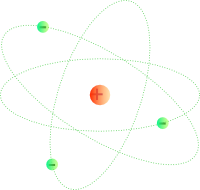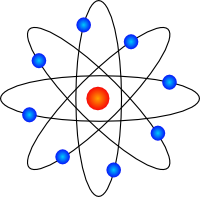Associations to the word «Electron»
Noun
- Microscopy
- Valence
- Ionization
- Microscope
- Conduction
- Photon
- Cathode
- Proton
- Scanning
- Diffraction
- Atom
- Scattering
- Spectroscopy
- Excitation
- Semiconductor
- Resonance
- Bonding
- Volt
- Accelerator
- Nucleus
- Ion
- Neutron
- Oxidation
- Dipole
- Spectrometry
- Anion
- Electrode
- Spin
- Ev
- Donor
- Conductivity
- Beam
- Transistor
- Molecule
- Acorn
- Lattice
- Spectrometer
- Emission
- Analyzer
- Particle
- Coupling
- Respiration
- Impurity
- Detector
- Hydrogen
- Momentum
- Tomography
- Plasma
- Polarization
- Filament
- Energy
- Planck
- Diode
- Micro
- Decay
- Vacuum
- Voltage
- Radiation
- Helium
- Annihilation
- Ligand
- Fluorescence
- Wavelength
- Sulfur
- Oscillation
- Absorption
- Faraday
- Phosphorylation
- Gamma
- Oxygen
- Potential
- Collision
- H2o
- Interaction
- Transfer
Adjective
Adverb
Pictures for the word «Electron»
Wiktionary
ELECTRON, noun. (particle) The subatomic particle having a negative charge and orbiting the nucleus; the flow of electrons in a conductor constitutes electricity.
ELECTRON, noun. (chemistry) (obsolete) Alloys of magnesium and other metals, like aluminum or zinc, that were manufactured by the German company Chemische Fabrik Griesheim-Elektron.
ELECTRON, proper noun. A taxonomic genus within the family Momotidae — two species of motmots.
ELECTRON AFFINITY, noun. (physics) The energy released when an electron is attached to an atom or molecule; used as a measure of its ability to form an anion
ELECTRON CAPTURE, noun. (physics) A nuclear reaction in which an electron (either free, or from the shell of the atom itself) is absorbed into a nucleus, a proton being converted into a neutron in the process
ELECTRON CAPTURE DETECTOR, noun. (analytical chemistry) An item of laboratory equipment used coupled to a gas chromatograph for the detection and quantification of very minute amounts halogenated organic compounds.
ELECTRON CAPTURE DETECTORS, noun. Plural of electron capture detector
ELECTRON CARRIER, noun. (biochemistry) Any of several classes of molecule that acts as both an acceptor and donator of electrons and functions in an energy-producing system such as photosynthesis
ELECTRON CLOUD, noun. (physics) A mathematically defined region around an atomic nucleus defined by a high probability that the atom's electrons will be present in that region.
ELECTRON CLOUDS, noun. Plural of electron cloud
ELECTRON CONFIGURATION, noun. (physics) (chemistry) The arrangement of electrons in an atom, molecule, or other physical structure like a crystal.
ELECTRON CONFIGURATIONS, noun. Plural of electron configuration
ELECTRON CRYOMICROSCOPY, noun. The electron microscopy of sensitive biological materials carried out at low temperature so as to limit damage to the structure of the material being examined
ELECTRON DENSITY, noun. (physics) A measure of the probability of finding an electron at a specific location within an orbital
ELECTRON DENSITY, noun. (physics) A measure of the number of electrons per unit volume of space.
ELECTRON DONOR, noun. (chemistry) A reducing agent that functions by donating electrons to another compound
ELECTRON GUN, noun. (physics) Any device that produces a stream of electrons, especially a narrow stream that is focused onto a phosphor screen.
ELECTRON GUNS, noun. Plural of electron gun
ELECTRON HOLE, noun. (physics) A vacant position in the atomic lattice of a conductor where an electron would normally be present
ELECTRON MICROGRAPH, noun. A micrograph produced using an electron microscope.
ELECTRON MICROGRAPHS, noun. Plural of electron micrograph
ELECTRON MICROSCOPE, noun. Any of several forms of microscope that use a beam of electrons, rather than one of light, and thus has a much greater resolving power.
ELECTRON MICROSCOPES, noun. Plural of electron microscope
ELECTRON MICROSCOPY, noun. Microscopy carried out using an electron microscope
ELECTRON NEUTRINO, noun. A leptonic elementary particle, having near-zero mass and no charge
ELECTRON NEUTRINOS, noun. Plural of electron neutrino
ELECTRON NUMBER, noun. (physics) The number of electrons in an atom or ion
ELECTRON PAIR, noun. (chemistry) (physics) Two electrons having opposite spin but all other quantum numbers the same; i.e two electrons in the same atomic orbital or molecular orbital, especially such electrons that function in concert to form a covalent bond
ELECTRON SHELL, noun. (physics) The collective states of all electrons in an atom having the same principal quantum number (visualized as an orbit in which the electrons move).
ELECTRON SPIN RESONANCE, noun. (physics) The absorption of radiation by species having unpaired electrons when placed in a magnetic field that is used spectroscopically to detect and study free radicals
ELECTRON TRANSFER REACTION, noun. (chemistry) a reaction in which a single electron is transferred from one molecule to another; one being oxidized and the other reduced (also known as a redox reaction); long-range electron transfer reactions are important in biological reactions involving metalloproteins such as haemoglobin
ELECTRON TRANSFER REACTIONS, noun. Plural of electron transfer reaction
ELECTRON TUBE, noun. (physics) Any of several devices consisting of a sealed chamber, either evacuated or filled with gas at low pressure, in which an electric current flows between electrodes.
ELECTRON TUBES, noun. Plural of electron tube
ELECTRON VOLT, noun. (physics) A unit for measuring the energy of subatomic particles; the energy equal to that attained by an electron moving through a potential difference of one volt. Equivalent to 1.6022 x 10-19 joules.
ELECTRON VOLTS, noun. Plural of electron volt
ELECTRON WAVE FUNCTION, noun. (physics) A function of the position and spin of an electron; related to the probability of finding the electron in a specified position
ELECTRON WAVE FUNCTIONS, noun. Plural of electron wave function
Dictionary definition
ELECTRON, noun. An elementary particle with negative charge.
Wise words
Every creature is a word of God.



